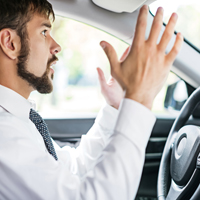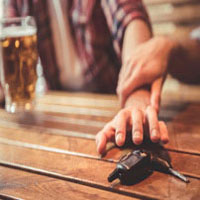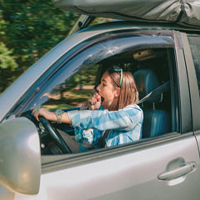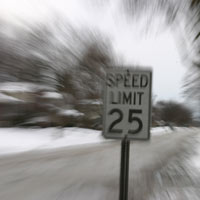Washington, D.C. Car Accident Lawyers
Suffering injuries in a car accident caused by someone else can have catastrophic consequences, especially if your injuries are severe or result in permanent disability. Over the following months, you can suffer losses in the form of mounting medical expenses, lost wages, repair and replacement costs, and much more.
If you have been injured in an accident caused by a negligent driver, our experienced Washington, D.C. car accident lawyers at the Law Offices of Duane O. King can provide exceptional legal guidance and support, protect your rights, and help you seek justice and compensation for your injuries and losses.
What Should I Do After a Car Accident in Washington, D.C.?
Drivers can use the following list of tips to manage an accident. Although these tips will not automatically result in a favorable settlement or claim, drivers can make it easier to prove their case and remain safe:
- Call 911.
- Check on other drivers.
- Get out of the roadway.
- Push cars to the side of the road.
- Obtain a police report and the officer’s badge number.
- Report the accident to your insurance company.
- Try to find witnesses willing to talk about what they saw.
- Seek medical care.
- Contact a car accident lawyer immediately.
What Types of Accident Cases Does the Law Offices of Duane O. King Handle?
The Law Offices of Duane O. King represents clients injured by negligent drivers in a wide range of accidents, including but not limited to:
- Car accidents
- Commercial truck accidents
- Construction zone car accidents
- Distracted driving accidents
- Drowsy driving accidents
- Drunk driving accidents
- Elderly driver accidents
- Highway accidents
- Motorcycle accidents
- Passenger injury accidents
- Pedestrian accidents
- Rear-end collisions
- Reckless driving accidents
- Rideshare accidents (Uber/Lyft)
- Rental car accidents
- Road rage accidents
- Roundabout accidents
- Side-impact or T-bone accidents
- Speeding accidents
- Teenage driver accidents
- Tow truck accidents
- Uninsured driver accidents
What Are the Leading Causes of Car Accidents?
According to the National Highway Traffic Safety Administration (NHTSA), approximately 40,000 people lose their lives in car accidents every year in the United States. Despite increasing safety features available in newer vehicles, car accident deaths have not declined, partly because the number of vehicle miles traveled in the country continues to rise. More cars on the roads mean more opportunities for car accidents, and despite major improvements in mass transit, traffic congestion from motor vehicles remains a problem. Driver error is responsible for 95 percent of car accidents, and many drivers commit multiple errors during every car trip.
Some of the most common causes of car accidents include:
- Distracted driving: The Washington, D.C. Metropolitan Police reports that distracted driving, such as texting, talking on the phone, or eating, is a leading cause of car accidents in the city. Using a cell phone and other electronics while driving is illegal in Washington, D.C. except to make emergency calls to 911 after stopping. Hands-free cell phone use is permitted under certain conditions. Your lawyer may be able to obtain cell phone records and pictures of the scene to demonstrate that the other driver was driving while distracted by other activities.
- Impaired driving: Driving while under the influence of alcohol or drugs is illegal and carries serious consequences. Proof of the other driver’s impairment is typically determined by responding law enforcement at the scene and documented in the police report.
- Speeding: Driving over the posted speed limit is still one of the most common causes of car accidents, and most drivers are guilty of speeding at some point. Higher speeds reduce stopping distance, decrease reaction time, and cause loss of control. Police or your lawyer can provide evidence of the other driver’s speed during the crash through skid marks, or lack thereof, at the scene through accident reconstruction.
- Reckless or aggressive driving: Actions such as improper lane changes, deliberately cutting off others, tailgating, excessive horn-honking, and road rage are all considered reckless or aggressive driving and endanger all motorists. Witness testimony, traffic or dash cam footage, and other methods can be used to establish that the other driver was driving recklessly or aggressively during the accident.
- Running red lights: Drivers run red lights regularly—and usually disastrously—in the District. Police, traffic cam and security footage, and eyewitness statements can establish that the accident occurred because the driver ran a red light.
- Nighttime driving: Many people are affected by decreased visibility at night, traffic congestion, oncoming traffic headlights, and thousands of business, street, and residential lights, which can contribute to confusion and hinder visibility at night. Your lawyer can request medical records regarding the other driver’s eyesight if a visual impairment is suspected in the accident.
- Tire blowouts: A blown tire is frightening and can occur anytime, especially on worn or defective tires. If your tire suddenly blows, do not slam the brakes — lower your speed and pull to the side of the road safe from traffic before exiting your vehicle. If your tires are not worn, your lawyer may be able to establish that the tires were defective or that the mechanic installed them improperly, leading to the accident.
- Left-hand turns: Turning left can be dangerous if an oncoming driver is not paying attention and hits you. Likewise, turning left into traffic or pedestrians without looking often causes drivers to have an accident. Witness statements, traffic camera footage, or police reports can indicate whether the driver made an unsafe or illegal left turn.
- Construction zones: Work zones can be confusing with changing traffic patterns, varying speeds, smaller lanes, barriers, and equipment or workers in your path. Determining fault in construction zone accidents can be challenging, as multiple responsible parties may exist. Your lawyer will have resources and a network of investigators and experts to help determine fault and liability.
Drivers who violate traffic laws and cause accidents and injuries should be held accountable. At the Law Offices of Duane O. King, our skilled Washington, D.C. car accident lawyers can protect your legal rights.
What Are the Most Dangerous Roads in Washington, D.C.?
According to police reports and traffic data, the most dangerous roads in Washington, D.C. are:
- New York Avenue NE (U.S. 50): New York Avenue is a major thoroughfare through the city with heavy traffic, congestion, and accidents each year, particularly around the intersections with Florida Avenue and Bladensburg Road.
- North Capitol Street: North Capitol Street is known for high-speed traffic, numerous pedestrians, and frequent accidents, especially at the intersections with H Street and New York Avenue.
- Kenilworth Avenue (D.C. Route 295): A major commuter route with high speeds and frequent collisions.
- Benning Road: Benning Road is another high-traffic roadway with high accident rates, often at the intersections with Minnesota Avenue and Benning Road Metro Station.
- Massachusetts Avenue: Massachusetts Avenue is a major arterial road featuring several hazardous intersections with Dupont Circle, Massachusetts Avenue NW, and 22nd Street NW.
- 14th Street NW: A busy road with ample vehicle, pedestrian, and bicycle traffic and problematic intersections with U Street and Columbia Heights.
- Rhode Island Avenue NE: This road has heavy traffic and several intersections prone to accidents.
What Are Washington, D.C. Traffic Laws?
Washington, D.C. traffic laws are meant to ensure safe traveling within the District. They include:
- Speed limits of 25 miles per hour on residential streets, 30 to 35 miles per hour on arterial streets, 15 miles per hour in alleys, and 15 miles per hour during school hours in school zones.
- All drivers and passengers must wear seat belts at all times, and young children must be secured in an appropriate child safety seat based on age and size.
- Pedestrians have the right of way at crosswalks and intersections.
- Drivers must yield to emergency vehicles with active sirens and lights.
- Blood alcohol concentration (BAC) limits for driving under the influence are:
- 0.08 percent for drivers over 21.
- 0.04 percent for commercial drivers.
- Zero tolerance for drivers under 21.
- A full stop is required at red traffic lights and stop signs. Right turns on red are allowed unless posted otherwise.
- Parking meters are enforced Monday through Saturday, and parking is prohibited in designated no-parking zones; some residential areas require a parking permit.
- Bicyclists must follow the same traffic laws as motor vehicles and use bike lanes where available.
- Pedestrians must use crosswalks and obey pedestrian signals.
- Only hands-free use of cell phones and other electronics is allowed; texting while driving is banned.
- All vehicles must be registered with the Washington, D.C. Department of Motor Vehicles (DMV).
- Proof of insurance is required for all vehicles.
Understanding these laws is crucial, especially in the event of a car accident. This is where having a car accident lawyer becomes important. A car accident lawyer can help you navigate the complexities of D.C. traffic laws and how they apply to your specific case. They can assist in determining fault by analyzing whether speed limits were exceeded, seat belts were worn, or if any right-of-way rules were violated. Moreover, a lawyer can help gather and present evidence, negotiate with insurance companies, and represent you in court if necessary. Ensuring you have legal representation can make a significant difference in the outcome of your case
How Is the Value of My Car Accident Case Determined?
Determining the value of car accident claims is difficult. Multiple factors must be considered, including but not limited to:
- The severity of the accident and injuries.
- Whether injuries are permanent and life-altering.
- The distribution of fault.
- Current and future lost income.
- Future expenses and losses.
An experienced and qualified car accident lawyer can provide a rough estimate of damages and, in some cases, employ economic experts to calculate and quantify accurate estimations and provide expert testimony.
What Factors Influence the Value of a Car Accident Settlement?
A jury determines the lawsuit’s outcome and monetary value if your car accident case results in a trial. They will consider numerous factors that can affect the outcome and influence the value of your claim, including but not limited to:
- Overall strength of the case.
- Perception of your and the at-fault driver’s credibility.
- Whether the accident was avoidable.
- Which driver is at fault for the crash.
- Severity of the accident and injuries.
- Vehicle conditions before and after the accident.
- Opposing counsel’s arguments refuting the claims and evidence.
- Witness statements and credibility.
- Pain and suffering you endure due to the accident and injuries.
- Any loss of companionship and life enjoyment.
What Is the Insurance Company’s Role in Determining Settlement Values?
In the early stages of your case, the insurance company will offer you an initial settlement, typically significantly low and insufficient to compensate for your losses. When you hire a lawyer and refuse the offer, the insurance company may continually increase the offer to settle the case before a trial. Several factors influence the insurance company’s perception and value of your claim, such as:
- Location and severity of the accident.
- Medical records confirming your injuries.
- Current and future lost wages.
- Your lawyer’s history of refusing early settlement offers and bringing cases to trial.
How Can a Washington, D.C. Car Accident Lawyer Help Me?
Every car accident is unique, and an experienced car accident lawyer knows and understands how to handle all facets of the case from the beginning. Retaining a lawyer as soon as possible after an accident is vital. Hiring an experienced car accident lawyer ensures your claim is handled properly to secure the best possible outcome. The Law Offices of Duane O. King can handle the following on your behalf:
- Investigate the accident scene.
- Review police reports.
- Establish fault and determine negligence.
- Interview witnesses.
- Collaborate with your medical team regarding your ongoing healthcare needs.
- Hire experts, if appropriate.
- Calculate economic and non-economic damages.
- File required documents by deadlines.
- Negotiate with insurance companies.
- Represent you in court if the case goes to trial.
Should I Release My Medical Records to the Other Driver’s Insurance Company?
Decisions on providing medical records, and how much, should be made by a seasoned car accident lawyer with extensive knowledge and experience regarding what information insurance companies are searching for and how they plan to use against you. Your medical records may include information that an opposing insurance company adjuster can manipulate to harm your claim.
What Are Common Misconceptions and Mistakes in Car Accidents?
The most common mistakes include:
- Moving the vehicle before documenting its location and condition.
- Not seeking immediate medical attention.
- Speaking with the at-fault insurance company.
- Making a recorded statement.
- Pursuing your accident claim without legal representation.
- Accepting an early settlement before understanding the full scope of your injuries.
The top misconceptions are believing the insurance company will:
- Do the right thing.
- Automatically pay submitted bills.
- Resolve the case in your favor.
- Provide ample compensation for pain and suffering.
- Not take the case to trial.
What Evidence Do I Need to Prove My Car Accident Claim?
You are responsible for providing evidence proving that the other driver is responsible for the accident. Potentially vital evidence includes:
- Police reports.
- Photos of the scene, damage, injuries, signage, road and weather conditions, and other contributing factors.
- Traffic or security camera footage.
- Witness statements.
- Accident-related bills.
- Doctors’ reports and medical records.
What Is the Legal Process for Car Accident Cases?
Your Washington, D.C. car accident lawyer will initiate the claim by notifying the insurance company that you have retained legal representation and establishing ourselves as the point of contact throughout your case. We will ensure that you receive proper medical treatment and send a demand letter to the insurance company detailing our position, medical bills, lost wages, pain and suffering, and demand an appropriate settlement figure. Insurance companies are not in the habit of meeting the initial demand, and negotiations will begin until we reach a settlement or file a lawsuit and take the case to trial.
What Are Common Car Accident Injuries?
In 2022, there were approximately 5.93 million motor vehicle crashes in America, and in those accidents, 42,514 people were killed. Americans often assume they will be fine if they wear a seat belt. Drivers are much safer if they wear a seat belt, but they could still be gravely injured. In the District of Columbia, 32 people were killed in traffic accidents in 2022. Traffic congestion is common in the D.C. area, and congestion can easily lead to more accidents as drivers enter and exit the city daily.
Many think the accident must be serious to result in injuries. However, even minor accidents can result in injuries that range in severity. Some of the most common injuries include amputation, broken bones, burns, cuts and lacerations, neck and spinal cord injuries, organ and nerve damage, psychological distress, traumatic brain injuries, and whiplash.
What Is the Statute of Limitations for Filing a Car Accident Claim?
In Washington, D.C., the statute of limitations for filing a car accident claim is three years from the date of the accident or death.
How Much Should I Interact With the Insurance Company?
Insurance companies collect as much information as possible on how, where, and why a car accident occurred and the injuries it caused to defend against a claim. They prefer to record statements made by those involved as early as possible before you understand the ramifications of what happens if your statements are used against you later. Before agreeing to a recorded statement, you should discuss the potential questions and your options with your lawyer.
How Is Fault Determined in Car Accidents?
Determining fault can be challenging and potentially involve multiple parties. Your lawyer and investigators have to examine whether both motorists contributed to the accident and the percentage of fault. Determining fault is vital to pursuing an accident claim. Washington, D.C. is one of the very few localities in the country that follows the rule of contributory negligence, which means that if you are found to have contributed to the accident in any way, you are barred from seeking compensation from the other driver. Under contributory negligence, you are also required to prove that the driver’s actions were negligent and caused the accident.
Should I Accept the Insurance Company’s First Offer?
Agreeing to an initial settlement without consulting your lawyer is typically never advisable. First, settlement offers are notoriously low and insufficient to cover the total cost of your losses. Once you agree to a settlement, the case is finished, and you cannot file any future claims if you suffer additional losses. The insurance company hopes you will accept an initial offer and put an end to the case. A skilled lawyer can negotiate for maximum compensation significantly higher than the insurance company’s offer.
Should I See a Doctor After a Car Accident?
Seeking medical attention as soon as possible after a car accident is crucial for your health and your claim. It is important to rule out internal injuries that can be life-threatening if left untreated. Claims submitted without medical evaluation and treatment are denied, and delayed evaluation can provide the insurance company defense to assert that your injuries are unrelated.
How Much Compensation Can I Recover for My Car Accident Claim?
The amount of compensation you can recover for a car accident depends on the unique circumstances of the accident and the extent of your injuries. Your lawyer can assess and calculate the economic and non-economic damages you deserve based on medical expenses, lost wages, property damage, pain and suffering, and more.
Will I Have to Go to Court?
Most car accident claims are settled out of court through negotiations between your lawyer and the insurance company. However, cases can proceed to trial if the insurance company is unwilling to negotiate or offer a fair settlement.
How Do Rideshare Accidents Differ From Other Accidents?
Rideshare accidents are unique because they present liability issues for everyone involved. If the driver of a rideshare vehicle is at fault for the accident, they must have insurance to pay for damages. If the rideshare corporation did not train or advise the driver of their need for adequate insurance, it could be liable for damages.
Rideshare accidents caused by another driver will involve the guilty driver’s insurance. Even though the victims in the backseat were not driving or affiliated with the driver, they should retrieve personal and insurance information from the driver who is found at fault.
Drivers should never leave the scene of a rideshare accident, assuming that the corporation sanctioning the vehicle will handle it. These companies do not own the vehicles involved in the accident, and they often have airtight contracts stating that their drivers are responsible for their insurance.
How Do Pedestrian Accidents Occur?
Pedestrian accidents can occur for several reasons. Drivers may have carelessly driven through an intersection, or pedestrians might have walked through a crosswalk without having the signal to go. It can be difficult for drivers to stop if a pedestrian darts in front of them. If pedestrians are standing on the street corner, they could be clipped by a large truck that has cut the corner while turning. Pedestrians should know who is on the road and who is turning and look both ways before crossing. Likewise, drivers should slow down at all intersections to exercise extra caution and avoid any pedestrians.
How Do Motorcycle Accidents Differ From Car Accidents?
Motorcycle accidents and car accidents vary dramatically because motorcycles do not weigh nearly as much as cars. Motorcycles can be difficult to see on the road, and they might dart through traffic with little to no warning. Motorcycle riders should be aware of other vehicles, obey the speed limit, and avoid making sudden movements. Car drivers should be on the lookout for motorcycles and leave enough distance.
Large truck drivers should be even more careful because a motorcycle could slide under a trailer instead of being sideswiped, and a rear-end wreck could be potentially fatal. Motorcyclists can also be thrown from their bikes during crashes, and motorcycles do not have the safety features found in cars.
How Do I Avoid a Truck Accident?
Truck accidents are easy to avoid if car drivers know what to look for on the road. First, large trucks are difficult to drive, slow to pick up speed and take quite a long time to stop. Drivers near large trucks should not cut them off and should leave them extra room when they turn.
Although large trucks can sideswipe small vehicles or cut corners when turning, large trucks can experience mechanical issues when driven too hard. For example, cutting off a large truck will cause the driver to overuse their brakes. If the brakes fail, the truck cannot stop. Car drivers use their brakes all the time without worry, but a large truck’s brakes must stop much more weight, and those trucks are often driven hundreds of thousands of miles between service appointments.
Truck drivers should also follow all federal guidelines provided by the Federal Motor Carrier Safety Administration (FMCSA) regarding rest periods, truck inspections, and cargo loading. For example, drivers might fall asleep at the wheel if they have driven too long, improperly loaded cargo might tip over a trailer, and trucks that have not been inspected could fail at any time.
What About Uninsured Drivers?
Uninsured drivers are on the road every day, even though every driver in America is required to carry automotive insurance by law. Because these uninsured motorists could cause an accident at any time, drivers need to know how to deal with these accidents. The uninsured motorist portion of an auto policy will pay for these damages. Damages caused by an accident might include lost wages, medical expenses, and property damage. It is best to review the uninsured motorist portion of the policy to ensure that it will provide enough coverage.
If drivers believe that their insurance company is not acting in good faith or the insurance has claimed that the other driver actually has insurance, a car accident lawyer can help. A lawyer from our office will review the policy, ensure that the policy is written lawfully, and challenge the insurance company. Clients are asked not to speak to the insurance company or complain to the other driver. The police have cited that driver, and they will need to pay out of pocket for their damages. Injured drivers or passengers might also file a lawsuit to recover damages from an uninsured driver.
Are Passenger Injuries Settled in a Lawsuit?
Passengers involved in accidents must know which party is at fault. The passenger in the car that caused the accident can file a claim against the driver’s insurance and possibly sue the driver for negligence. If the passenger is in a car that did not cause the accident, that passenger can file a claim against the other driver’s insurance.
Passengers may, however, have a role in an accident. If a passenger is found to have contributed to causing the accident, their claim could be denied. Distracted driving includes interacting with passengers. A passenger who causes an accident could be sued by the vehicle’s driver and anyone else who was injured in the crash.
Can Motorists File a Wrongful Death Claim After a Car Accident?
Motorists and their families can file a wrongful death claim if they have lost someone in an accident. A wrongful death case can be brought when a driver or passenger dies and would have qualified for a personal injury suit or claim.
The driver or passenger may not have been killed in the accident, but they may have died as a result of the injuries they sustained in the accident. Therefore, all accident victims should seek immediate medical attention. For example, someone who develops internal bleeding needs a doctor to diagnose and treat the problem. If not, the other driver, their lawyer, and their insurance company can claim those injuries were not sustained in the accident.
Those filing a wrongful death claim must know the three-year statute of limitations. Families must also follow the rules set forth by the state. Individuals may file a wrongful death claim:
- If they are the child, spouse, or parent of the deceased.
- If they are an extended family member who depended on the deceased.
- If they represent the deceased’s estate.
The Law Offices of Duane O. King should be contacted as soon as possible to avoid delays. Families that miss the statute of limitations will have their cases rejected by the court.
Our Washington, D.C. Car Accident Lawyers at the Law Offices of Duane O. King Will Help You After Any Type of Crash
When you suffer injuries in a car accident caused by someone else, you need the experience and support of our Washington, D.C. car accident lawyers at the Law Offices of Duane O. King, P.C. Call us at 202-931-6252 or contact us online for a free consultation. Located in Washington, D.C., Alexandria, and Falls Church, Virginia, we serve clients in Prince George’s County, including Laurel, Beltsville, Adelphi, College Park, Greenbelt, Mitchellville, Woodmore, Greater Upper Marlboro, Springdale, Largo, Bowie, Capitol Heights, District Heights, Forestville, Suitland, Seat Pleasant, Clinton, Oxon Hill, Temple Hills, and Fort Washington.






